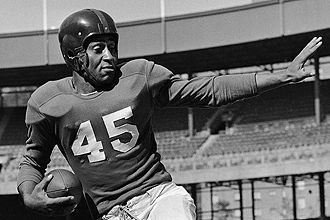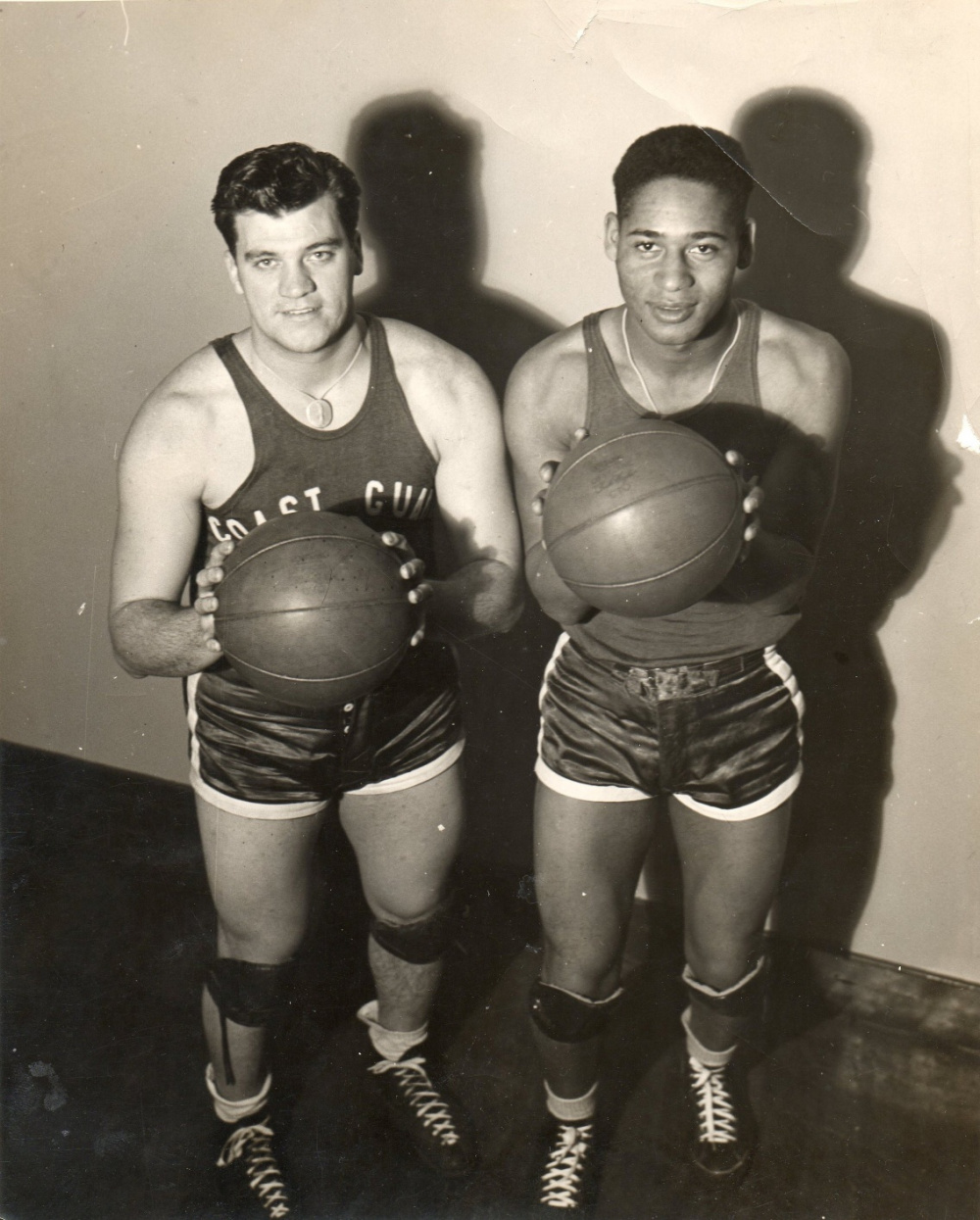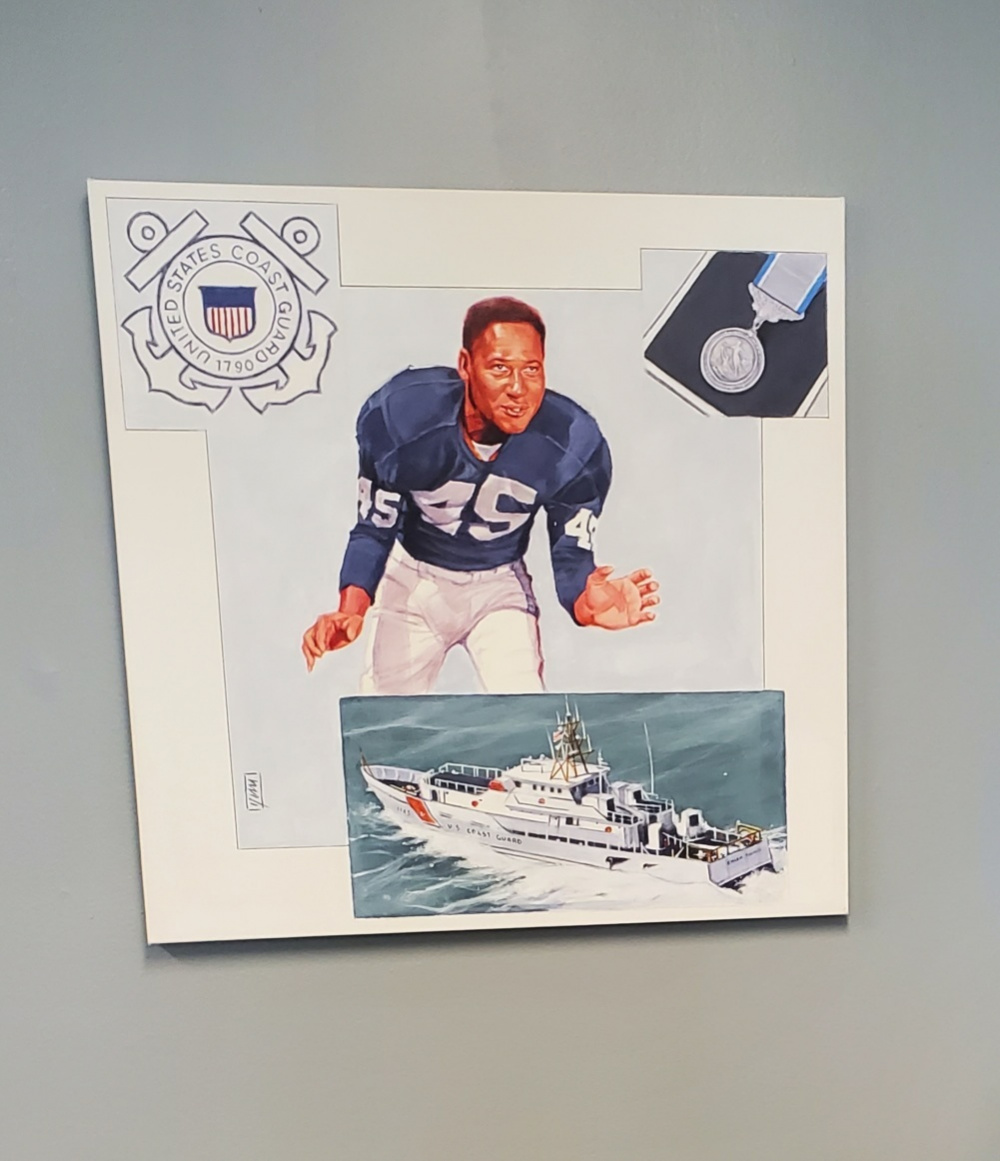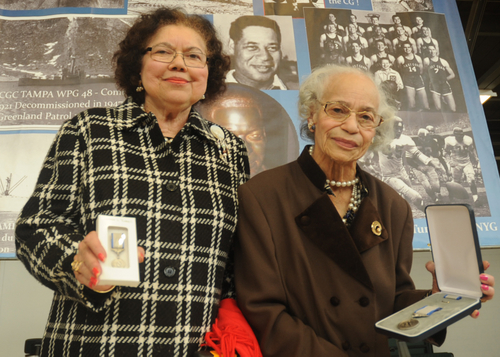When Vince Lombardi became head coach of the Green Bay Packers in the 1950s, his first big move was to sign Coast Guard hero Emlen Tunnell. It was a smart move - Tunnell earned the nickname "Mr. Defense," and became the first African American inducted into the Pro Football Hall of Fame.
Bu t before his storied football career, Tunnell stepped up to serve his country at a time of war, saving two men's lives and earning the Coast Guard Silver Lifesaving Medal. He continued to demonstrate honor, respect and devotion to duty while wearing the No. 45 jersey for the New York Giants and the Packers. Known as "Mr. Defense" on the field, he helped ease interracial tensions and mentored young players off the field.
t before his storied football career, Tunnell stepped up to serve his country at a time of war, saving two men's lives and earning the Coast Guard Silver Lifesaving Medal. He continued to demonstrate honor, respect and devotion to duty while wearing the No. 45 jersey for the New York Giants and the Packers. Known as "Mr. Defense" on the field, he helped ease interracial tensions and mentored young players off the field.
The Coast Guard is recognizing Tunnell with a cutter and training center that won’t just bear his name – they’ll carry on his legacy.
This fall, the USCGC Emlen Tunnel will become our 45th Sentinel-class fast response cutter. Meanwhile, the Coast Guard Academy’s new Emlen Tunnell Strength and Conditioning Center will help develop future generations of Coast Guard athletes.
Saving shipmates while protecting the homeland
Tunnell was born in Bryn Mawr, Pennsylvania, and grew up in a multi-ethnic neighborhood just north of Philadelphia. 
His sister Vivian later said her brother "learned from his environment – be yourself, but adapt to others who might be different in the group."
Tunnell attended the University of Toledo to play football in 1942, but was knocked unconscious by a collision that broke his neck. Told he would never play football again, he turned to basketball at Toledo instead, but like many American men during this time period, he wanted to enlist in the military.
He approached the Army and the Navy, but was rejected to serve because of his neck injury. This did not stop him from wanting to serve his country and with persistence, Tunnell was able to enlist in the Coast Guard despite never being on a boat and barely being able to swim.
Tunnell became a steward's mate and was one of five African-Americans assigned to the USS Etamin, where he made friends by talking about sports. One of those buddies was Machinist's Mate First Class Fred Shaver.
On April 27, 1944, the Coast Guard-manned cargo ship USS Etamin was unloading 6000 tons of explosives and gasoline while at anchor at Aitape Harbor, Papua New Guinea. Without warning, Etamin was attacked by Japanese aircraft and a torpedo blew a hole 27 feet by 27 feet in the ship’s starboard side.
With the shell plating and shaft alley of Etamin ruptured, gasoline sprayed all over the ship and caused an explosion in the engine room.
Shaver stayed below deck with two other machinists, shutting down many of the ship’s functions to prevent a larger explosion. He was quickly engulfed by flames, and climbed a ladder to the deck for help.
“I really don’t know how I knew the horrible figure running toward me in the darkness was Freddy,” Tunnell wrote in his autobiography, “Footsteps of a Giant.” “There was almost nothing recognizable about him. He was covered with fire.”
Tunnell beat out the flames with his hands, and carried his shipmate to safety. Shaver was the only machinist to survive that day.
“It was an amazingly brave thing for Emlen to do,” Shaver later told the New York Times. “Emlen ran after me across that deck like he was chasing a halfback. Then beat the flames out with his bare hands. He was burned, too. Emlen didn’t want to make a big deal out of it. But he is the one who helped me when I needed it.”
Tunnell, who was known to speak in football metaphors, later recalled the sinking ship as “a small, tough fullback, without much speed, pounding forward every minute of the game.”
Two years later, Tunnell – who was still not a great swimmer - jumped from the USS Tampa into frigid water to save a drowning shipmate, Alfred Givens. He was treated for hypothermia and shock.
In recognition of Tunnell’s heroic actions, the commanding officer of Tampa, Cmdr. Ralph Jenkins, nominated Tunnell for the Silver Lifesaving Medal. A momentous occasion considering African Americans were not customarily awarded medals at that time in our history. Tunnell would receive a posthumous Combat Action Ribbon and Silver Lifesaving Medal.
From the sea to the Hall of Fame 
After serving in the Coast Guard, Tunnell went to the University of Iowa, where he made the team.
After getting a questionnaire from the New York Giants, Tunnell decided to hitchhike to New York – he set out with $1.50 in his pocket. The way Giants’ founder Tim Mara told the story, he said to Tunnell: “Well, if you’re here, you might as well try out.”
Tunnell donned the No. 45 jersey, at a time when it was not easy to be black on a pro football team. At first, fans chanted at him to “go home.” He became the team’s golden boy, an easygoing jokester behind the scenes, but a ferocious force on the field. The jeers quickly turned to cheers.
When his assistant coach Vince Lombardi got tapped to overhaul the Packers, he asked Tunnell to join him.
“On arrival in his new home, Tunnell was told he had just doubled the black population in Green Bay,” wrote the New York Times. “The city’s other African-American, Tunnell heard, was the shoeshine man at the Hotel Northland. ‘Well, I’ll live there, then,” Tunnell said.”
He became the center of gravity for his black teammates, and his presence helped ease racial tensions on the team and within the league. “Emlen could defuse anything just by talking to people,” one of his teammates said.
He was also known as playing “offense on defense.” When he retired, he held NFL career records for interceptions, interception return yards, punt returns and punt return yards.
Tunnell was named to the NFL’s 1950’s All-Decade Team and the all-time All-Pro team, and was ranked 70 on The Sporting News’ list of the 100 Greatest Football Players.
He went on to become the first African American scout, talent scout, assistant coach and first full-time assistant coach in the NFL. He was the first African American and first defensive player inducted into the Pro Football Hall of Fame in 1967.
Emlen Tunnell’s NFL records for interceptions and punt returns were still unbroken when he died in 1975.
Honoring a Coast Guard hero
The Coast Guard awarded Tunnell a posthumous Silver Lifesaving Medal for heroism in 2011. Accepting the medal on his behalf were his sister Vivian Tunnell, and her daughter Catherine Robinson.
Also present was one very special guest - Fred Shaver's daughter.
“All my life, I wanted to thank Emlen for saving my father’s life,” Nancy Shaver told the New York Times about attending the award ceremony in California. “And if not him, then his family. And so I did.”
In a tribute to the strength and courage of Tunnell, the Coast Guard Academy will be opening the Emlen Tunnell Strength and Conditioning Center, a $3.5M project made possible by the Coast Guard Academy Alumni Association. The center will continue to honor his legacy by inspiring cadets to reach their potential on the field, in the fleet, and in their daily lives.
The Coast Guard will commission the USCGC Emlen Tunnell this fall. The cutter will be assigned to Patrol Forces Southwest Asia and stationed in Manama, Bahrain.
This Black History month, we not only honor Emlen Tunnell, but we reflect on the many African Americans who served in the Coast Guard and its predecessor services dating back to the very founding of the Service in 1790. These men and women not only forever changed the course of Coast Guard history, but also live on as we take time to honor those who paved the way for so many today.